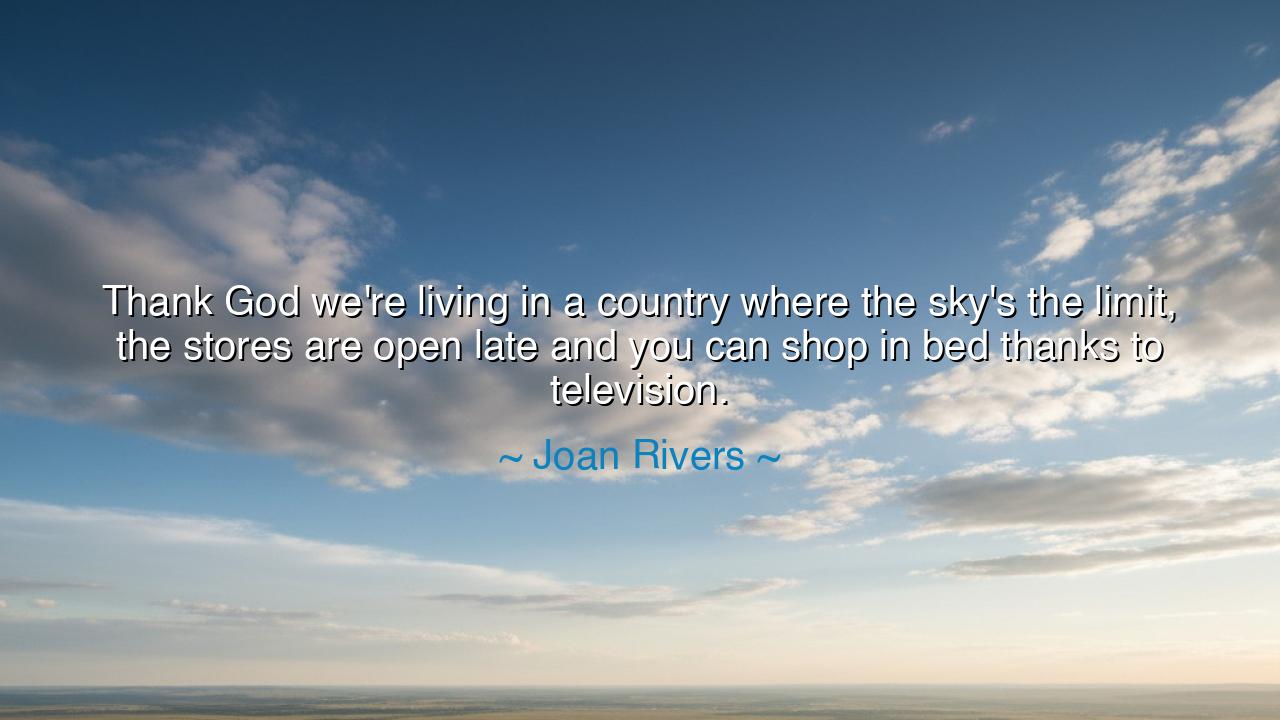
Thank God we're living in a country where the sky's the limit
Thank God we're living in a country where the sky's the limit, the stores are open late and you can shop in bed thanks to television.






The words of Joan Rivers, “Thank God we’re living in a country where the sky’s the limit, the stores are open late and you can shop in bed thanks to television,” sparkle with wit, yet behind the laughter lies a profound reflection on freedom, opportunity, and abundance. Rivers, a master of comedy, cloaked truth in humor, yet the ancient ear can hear in her words the hymn of gratitude for a society where choice and possibility seem boundless. She captures the spirit of a culture that has not only survived but flourished, a culture where ambition may rise as high as the heavens and convenience itself feels like a miracle.
When she says, “the sky’s the limit,” she evokes the spirit of aspiration that has always driven human progress. The ancients longed for such possibility, but were often bound by class, station, and fate. A farmer in Athens could never dream of becoming a philosopher king; a slave in Rome could seldom hope to rise above his chains. Rivers’ words remind us of the uniqueness of a society that offers the dream of ascent to anyone bold enough to pursue it. Her humor lightly masks a heroic truth: opportunity itself is a gift, one for which thanksgiving is due.
The mention of “stores open late” reflects not merely convenience, but abundance. For most of human history, survival meant labor from dawn to dusk, and goods were scarce, rationed, or difficult to find. Imagine the peasants of medieval Europe, who toiled under lords, with little hope of variety or choice. Now, Rivers marvels that not only do goods overflow, but they are accessible at nearly any hour. The convenience of late stores is a symbol of prosperity: a reminder that we live in a time of plenty compared to the long ages of want.
Her final phrase, “shop in bed thanks to television,” captures the spirit of modern marvels. To those who lived before electricity, this would have sounded like sorcery: the ability to lie in rest and yet see, hear, and even purchase goods from afar. Rivers, with characteristic wit, exaggerates the absurdity and wonder of modern invention. Yet beneath the jest lies awe: human ingenuity has reshaped the rhythms of life so profoundly that luxuries once unimaginable are now ordinary. The ancients would have likened this to the gifts of the gods, who provided tools and fire to humanity.
A historical example can be seen in the Industrial Revolution. It brought forth inventions — steam power, factories, and mass production — that transformed scarcity into abundance. Yet it also brought both opportunity and excess. Much like Rivers, observers of that age marveled at how rapidly life changed, how goods once reserved for kings became available to common folk. In her words, we hear the echo of those same marvels, updated for a world of television, shopping channels, and twenty-four-hour commerce.
Yet Rivers also teaches through her humor the importance of gratitude. For one could scoff at such conveniences, taking them for granted, or even deride them as trivial. But she calls us to “thank God,” even in jest, for the prosperity, the freedom, and the comfort of her time and place. Her humor conceals a truth: joy is not found in possessions themselves, but in the recognition of the privilege of having them. Gratitude transforms excess into blessing.
The lesson for us, then, is to look at our own lives with the same wonder, even in the ordinary. Do not dismiss the marvels of modernity, nor take for granted the liberties you enjoy. See the opportunity to dream, the abundance of choice, the miracles of invention, as gifts not to be wasted but appreciated. For if the ancients could look upon our lives, they would see wealth beyond imagining.
As practical action, cultivate daily gratitude not only for the grand blessings but for the conveniences that shape your life: the warmth of light at a switch, the abundance of food, the ability to connect across distances. Recognize these not as entitlements but as marvels. And like Rivers, let your gratitude be laced with laughter, for humor too is a form of thanksgiving.
Thus, Joan Rivers’ words, though clothed in jest, carry an ancient truth: we live in an age of wonder, where the sky is the limit, where abundance surrounds us, and where gratitude must be our response. To laugh, to give thanks, and to marvel — this is the true way to honor the gifts of our time.






AAdministratorAdministrator
Welcome, honored guests. Please leave a comment, we will respond soon